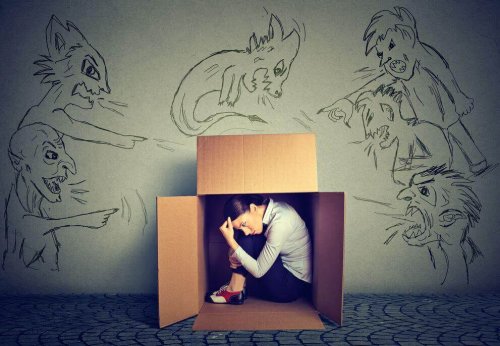Emotional Uncertainty - When Angst Takes Over


Written and verified by the psychologist Valeria Sabater
Angst is a paralyzing emotional state. When you feel angst, you feel anxious, scared, and threatened for no specific reason. You have a sense of existential emptiness, you feel a weight on your shoulders that makes it hard to breathe. This psychological state is very common these days. While it’s usually associated with panic disorders, there are other triggers that are worth discussing.
You’ve probably told someone before that you were feeling “angsty.” This word is very familiar to all of us, especially with teenagers. When you hear it, you generally know exactly what the other person means. However, from a clinical point of view, this psychological experience is quite complex.
“Angst, just like other mental states that produce suffering, like sadness or guilt, is a struggle that is quintessentially human.”
-Mario Bendetti-
What is the exact origin of this emotion? Is it the same as anxiety, or something more? From a psychological point of view, there’s always some confusion and disagreement about the definition. Philosophers, on the other hand, have always been very clear about the meaning of this term. The word angst is German and has a very specific definition. It’s something that causes distress and hardship.
Take Søren Kierkegaard, for example. He believed that this emotion is the acknowledgment that human beings are finite. Therefore, when we contemplate the (limited) future possibilities, we feel dizzy and scared. Jean-Paul Sartre, on the other hand, explained that angst comes from being aware that everything that happens to you is a result of your own decisions. You are the one truly responsible for your happiness or unhappiness.

What exactly is angst and what are its characteristics?
Angst and anxiety share the same “guest”: fear. That being said, in the case of angst, there are some underlying characteristics that make up this suffering that is so common in certain stages of life.
- Angst is fear of something undefinable.
- Feeling angst means anticipating irrational things and only thinking of future dangers.
- The present is empty. If you feel angst, the present paralyzes you. You only think about what is to come. Tomorrow is uncomfortable and scary.
- This psychological experience also has physical symptoms. You might feel like you can’t breathe, or have chest pain or palpitations.
You can see right away that it’s pretty difficult to differentiate angst from simple anxiety. In fact, the primary symptom of panic disorders is a feeling of angst. That’s why it’s very common for an individual to have symptoms of both. Angst can act as a trigger for a panic attack. These are complex clinical cases and the only way to really make a diagnosis is to evaluate each patient individually.

Why do we experience angst?
Philosophers explain that humans experience angst when they become aware of their existence. We feel angst when we realize we won’t be around forever. Awareness that our decisions affect us and that we can’t stop the passing of time also trigger angst. This uncertainty is very present in this day and age for a very simple reason. If there’s one thing that is true of modern society, it’s that we can’t know what will happen tomorrow. Work, the economy, relationships… Everything can change from one day to the next. All of this insecurity leads to angst.
“The real man smiles in trouble, gathers strength from distress, and grows brave by reflection.”
-Thomas Paine-
So, it’s important to clarify that experiencing angst is completely normal. There’s nothing pathological about it, it doesn’t mean there’s something wrong with you. That is, as long as the angst is adaptive. In other words, the angst you experience helps you reflect on your situation so that you can make a decision about the future. This is what Sigmund Freud defined as “realistic angst.”

Now, the flip side of that is maladaptive angst. This is what we described earlier. Here are its origins:
- Personal crises that aren’t properly managed. These are emotional states that become chronic. They might be combined with other disorders as well, such as depression.
- Feeling unable to manage certain situations. Things like unemployment, breakups, or an upcoming change can trigger this type of angst.
- Problems with relationships – deceit, disagreements, etc.
- The genetic factor is also important. Often we feel angst for no apparent reason. The explanation there might be genetic. We know, for example, that there are certain people who are predisposed to adrenaline rushes or decreases in gamma-Aminobutyric acid (GABA). All of these neurochemical changes can also trigger angst.
People who experience angst crises can usually experience adequate relief with therapy. Cognitive behavioral therapy, acceptance and commitment therapy, as well as techniques like mindfulness are some of the most helpful strategies. In more serious cases, the individual might need medication.
This text is provided for informational purposes only and does not replace consultation with a professional. If in doubt, consult your specialist.








